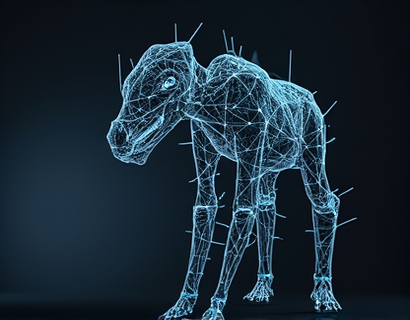Decentralized Authentication: Revolutionizing Business Security and Access with Advanced Identity Management Solutions
In the digital age, the importance of robust security measures cannot be overstated. As businesses increasingly rely on digital platforms to conduct operations, the need for advanced identity management solutions has become paramount. Decentralized authentication stands out as a transformative approach, offering enhanced security, efficiency, and user experience. This article delves into the intricacies of decentralized authentication, exploring how it is revolutionizing business security and access control through innovative identity management solutions.
Traditional authentication methods, such as username-password combinations and centralized databases, have proven to be vulnerable to breaches and cyber attacks. These systems often rely on a single point of failure, making them attractive targets for malicious actors. Decentralized authentication, on the other hand, distributes control and storage across a network of nodes, eliminating the risk associated with centralized databases. This decentralized approach not only enhances security but also improves the overall user experience by providing seamless access to resources.
The core principle of decentralized authentication lies in the use of blockchain technology and distributed ledgers. Blockchain, known for its transparency and immutability, ensures that identity data is securely stored and cannot be altered without consensus from the network. This technology enables the creation of self-sovereign identities, where users have full control over their personal data and can manage access permissions dynamically. By leveraging smart contracts, decentralized authentication systems can automate and enforce complex access control policies, reducing the administrative burden and minimizing human error.
One of the key benefits of decentralized authentication is the enhancement of data protection. In a centralized system, a breach can expose vast amounts of user data, leading to significant financial and reputational damage. Decentralized systems, however, store identity information across multiple nodes, making it extremely difficult for attackers to compromise the entire system. Even if one node is breached, the data remains secure on other nodes, ensuring continuity and integrity. This distributed nature of decentralized authentication not only strengthens security but also complies with stringent data protection regulations such as GDPR and CCPA.
Another significant advantage of decentralized authentication is the improvement in user experience. Traditional authentication methods often result in friction, with users facing multiple login steps and remembering complex passwords. Decentralized solutions can integrate with various identity providers and use biometric data, reducing the need for multiple credentials. This streamlined process not only enhances user convenience but also increases adoption rates, as users are more likely to engage with systems that offer a smooth and secure experience.
For businesses, the implementation of decentralized authentication solutions can lead to substantial operational efficiencies. By automating identity verification and access control, organizations can reduce the workload on IT departments and minimize the risk of human errors. This automation also allows for real-time monitoring and auditing of access logs, providing insights into user behavior and potential security threats. As a result, businesses can focus on core operations while relying on advanced identity management to maintain a secure environment.
Decentralized authentication services and software are designed to cater to the diverse needs of modern enterprises. These solutions offer scalable and flexible options, enabling businesses to integrate seamlessly with existing systems and workflows. For instance, decentralized identity platforms can be used to manage employee access, customer authentication, and third-party integrations, all within a unified framework. This comprehensive approach ensures that all aspects of business operations are covered, from internal access to external partnerships.
One of the leading technologies in decentralized authentication is Self-Sovereign Identity (SSI). SSI empowers individuals and organizations to own and control their digital identities without relying on intermediaries. By using decentralized identifiers (DIDs) and verifiable credentials, SSI enables users to prove their identity and attributes in a secure and privacy-preserving manner. This technology is particularly beneficial for businesses operating in industries with strict compliance requirements, such as finance and healthcare, where verifiable and auditable identity checks are essential.
Interoperability is another critical aspect of decentralized authentication. As businesses increasingly operate in a connected ecosystem, the ability to seamlessly integrate with various systems and platforms is crucial. Decentralized authentication solutions are designed to be interoperable, supporting multiple standards and protocols such as OAuth, OpenID Connect, and WebAuthn. This ensures that businesses can integrate with existing identity providers and third-party services without significant overhauls, making the transition to decentralized authentication more feasible and cost-effective.
The adoption of decentralized authentication is not without challenges. One of the primary hurdles is the need for widespread education and awareness. Many businesses and users are still unfamiliar with the concepts and benefits of decentralized identity management. Educational initiatives and case studies demonstrating the success of decentralized authentication in real-world scenarios can help drive adoption. Additionally, regulatory frameworks need to evolve to support and encourage the use of decentralized technologies, providing clear guidelines and standards for implementation.
Technical challenges also exist, particularly in terms of scalability and performance. As the number of users and transactions increases, decentralized systems must be able to handle the load efficiently without compromising on security or user experience. Continuous research and development in blockchain and distributed systems are essential to address these challenges, ensuring that decentralized authentication solutions can scale to meet the demands of large enterprises.
Despite these challenges, the potential benefits of decentralized authentication are undeniable. By adopting advanced identity management solutions, businesses can significantly enhance their security posture, reduce operational costs, and improve user satisfaction. The shift towards decentralized authentication represents a paradigm change in how identity and access are managed, moving from a centralized, vulnerable model to a distributed, resilient one.
In conclusion, decentralized authentication is at the forefront of a new era in business security and access control. By leveraging blockchain technology and decentralized identity management, organizations can achieve a higher level of data protection, operational efficiency, and user convenience. As the technology matures and adoption increases, decentralized authentication will play a crucial role in shaping the future of digital security, enabling businesses to thrive in an increasingly connected and complex world.











































